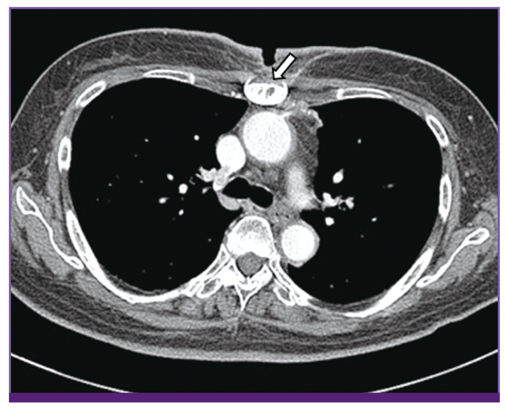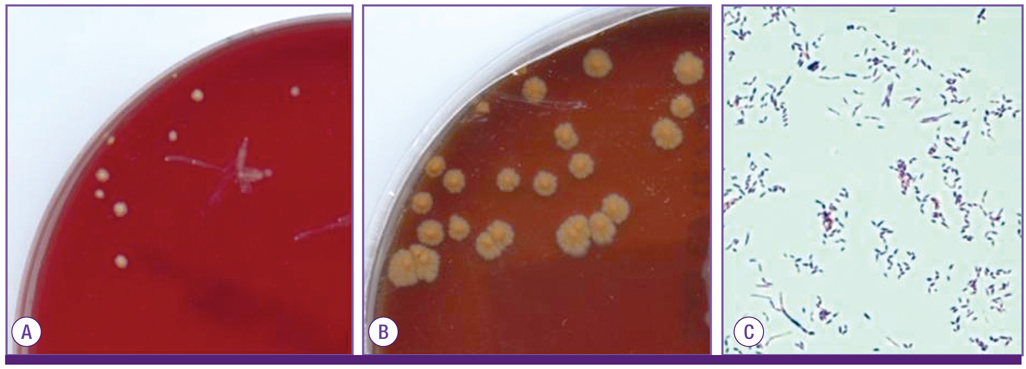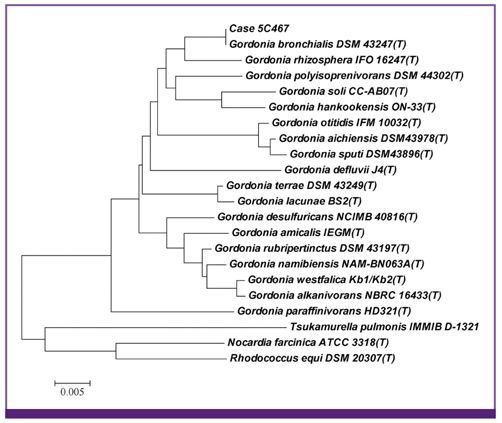Infect Chemother.
2014 Jun;46(2):110-114. 10.3947/ic.2014.46.2.110.
Sternal Osteomyelitis Caused by Gordonia bronchialis after Open-Heart Surgery
- Affiliations
-
- 1Department of Laboratory Medicine, Asan Medical Center University of Ulsan College of Medicine, Seoul, Korea. sung@amc.seoul.kr
- 2Division of Infectious Diseases, Department of Internal Medicine, Asan Medical Center University of Ulsan College of Medicine, Seoul, Korea.
- 3Department of Thoracic Surgery, Asan Medical Center University of Ulsan College of Medicine, Seoul, Korea.
- KMID: 2284988
- DOI: http://doi.org/10.3947/ic.2014.46.2.110
Abstract
- We report the case of a deep sternal wound infection with sternal osteomyelitis caused by Gordonia bronchialis after open-heart surgery. The isolate was identified as a G. bronchialis by 16S rRNA and hsp65 gene sequencing, having initially been misidentified as a Rhodococcus by a commercial phenotypic identification system.
MeSH Terms
Figure
Reference
-
1. Arenskötter M, Bröker D, Steinbüchel A. Biology of the metabolically diverse genus Gordonia. Appl Environ Microbiol. 2004; 70:3195–3204.
Article2. Shen FT, Goodfellow M, Jones AL, Chen YP, Arun AB, Lai WA, Rekha PD, Young CC. Gordonia soli sp. nov., a novel actinomycete isolated from soil. Int J Syst Evol Microbiol. 2006; 56:2597–2601.3. Richet HM, Craven PC, Brown JM, Lasker BA, Cox CD, McNeil MM, Tice AD, Jarvis WR, Tablan OC. A cluster of Rhodococcus (Gordona) bronchialis sternal-wound infections after coronary-artery bypass surgery. N Engl J Med. 1991; 324:104–109.
Article4. Wright SN, Gerry JS, Busowski MT, Klochko AY, McNulty SG, Brown SA, Sieger BE, Ken Michaels P, Wallace MR. Gordonia bronchialis sternal wound infection in 3 patients following open heart surgery: intraoperative transmission from a healthcare worker. Infect Control Hosp Epidemiol. 2012; 33:1238–1241.
Article5. Aoyama K, Kang Y, Yazawa K, Gonoi T, Kamei K, Mikami Y. Characterization of clinical isolates of Gordonia species in Japanese clinical samples during 1998-2008. Mycopathologia. 2009; 168:175–183.
Article6. Johnson JA, Onderdonk AB, Cosimi LA, Yawetz S, Lasker BA, Bolcen SJ, Brown JM, Marty FM. Gordonia bronchialis bacteremia and pleural infection: case report and review of the literature. J Clin Microbiol. 2011; 49:1662–1666.
Article7. Drancourt M, Pelletier J, Cherif AA, Raoult D. Gordona terrae central nervous system infection in an immunocompetent patient. J Clin Microbiol. 1997; 35:379–382.
Article8. Gil-Sande E, Brun-Otero M, Campo-Cerecedo F, Esteban E, Aguilar L, García-de-Lomas J. Etiological misidentification by routine biochemical tests of bacteremia caused by Gordonia terrae infection in the course of an episode of acute cholecystitis. J Clin Microbiol. 2006; 44:2645–2647.
Article9. Bosshard PP, Abels S, Altwegg M, Böttger EC, Zbinden R. Comparison of conventional and molecular methods for identification of aerobic catalase-negative gram-positive cocci in the clinical laboratory. J Clin Microbiol. 2004; 42:2065–2073.
Article10. Relman DA. Universal bacterial 16S rRNA amplification and sequencing. In : Persing DH, Smith TF, Tenover FC, White TJ, editors. Diagnostic molecular microbiology principles and applications. 1st ed. Washington, DC: ASM Press;1993. p. 489–495.11. Yin X, Liang S, Sun X, Luo S, Wang Z, Li R. Ocular nocardiosis: HSP65 gene sequencing for species identification of Nocardia spp. Am J Ophthalmol. 2007; 144:570–573.
Article12. Petti CA, Bosshard PP, Brandt ME, Clarridge JE, Feldblyum TV, Foxall P, Furtado MR, Pace N, Procop G. Interpretive criteria for identification of bacteria and fungi by DNA target sequencing : approved guideline. Wayne, PA: CLSI;2008.13. Clinical and Laboratory Standards Institute. Susceptibility testing of mycobacteria, Nocardiae, and other aerobic actinomycetes; approved standard-second edition. M24-A2. Wayne, PA: CLSI;2011.14. Tsukamura M. Proposal of a new genus, Gordona, for slightly acid-fast organisms occurring in sputa of patients with pulmonary disease and in soil. J Gen Microbiol. 1971; 68:15–26.
Article15. Drancourt M, McNeil MM, Brown JM, Lasker BA, Maurin M, Choux M, Raoult D. Brain abscess due to Gordona terrae in an immunocompromised child: case report and review of infections caused by G. terrae. Clin Infect Dis. 1994; 19:258–262.
Article16. Müller F, Schaal KP, von Graevenitz A, von Moos L, Woolcock JB, Wüst J, Yassin AF. Characterization of Rhodococcus equi-like bacterium isolated from a wound infection in a noncompromised host. J Clin Microbiol. 1988; 26:618–620.
Article17. Siddiqui N, Toumeh A, Georgescu C. Tibial osteomyelitis caused by Gordonia bronchialis in an immunocompetent patient. J Clin Microbiol. 2012; 50:3119–3121.
Article18. Blaschke AJ, Bender J, Byington CL, Korgenski K, Daly J, Petti CA, Pavia AT, Ampofo K. Gordonia species: emerging pathogens in pediatric patients that are identified by 16S ribosomal RNA gene sequencing. Clin Infect Dis. 2007; 45:483–486.
Article
- Full Text Links
- Actions
-
Cited
- CITED
-
- Close
- Share
- Similar articles
-
- Primary Sternal Osteomyelitis Caused by Actinomyces israelii
- Primary Sternal Osteomyelitis: A case report
- Acute Osteomyelitis of the Mandible by Extended-Spectrum ββ-Lactamase Producing Klebsiella Pneumoniae: A Case Report
- Sternal Tuberculosis: A Case Report
- Irrigation-suction System for Management of Deep Sternal Wound Infection after Open Heart Surgery: Four cases




